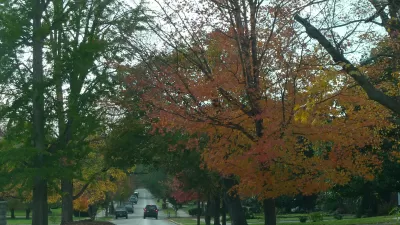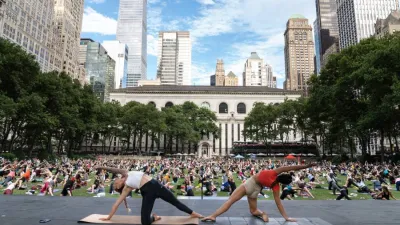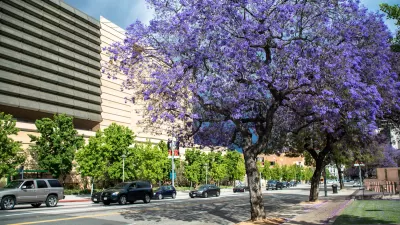New research by the Trust for Public Land explores connections between urban parks and health, building on prior research and offering insights such as the growing importance of partnerships with health organizations.

When you are feeling stressed or overwhelmed, you may want to spend some time at a park. Numerous studies have documented the physical and mental health benefits that parks offer. Adding to this literature, the Trust for Public Land (TPL) recently published a new report called “The Power of Parks to Promote Health” in conjunction with the release of its annual ranking of cities based on their park systems (ParkScore).
The report reveals that park systems are working in new ways with other organizations in communities to create programs and services focused on producing better health outcomes, including partnerships with health-care insurance companies and health-care providers. In fact, a majority of the 100 cities in the ParkScore rankings have a formal partnership with a health-care institution of some sort, and in a quarter of them, a health organization is providing funding or staff for health programs. Overall, TPL found over 800 examples of programs with targeted health outcomes.
TPL also shows that the better the park system, the greater the health benefits. On average, TPL reports that people living in cities in its top 25 are 21 percent less likely to be physically inactive and 9 percent less likely to have mental health problems than those in the bottom 25.
For details, please read the source article by Carl Smith.
FULL STORY: Stressed, Overwhelmed, Out of Shape? There Is a Park for That

Planetizen Federal Action Tracker
A weekly monitor of how Trump’s orders and actions are impacting planners and planning in America.

Maui's Vacation Rental Debate Turns Ugly
Verbal attacks, misinformation campaigns and fistfights plague a high-stakes debate to convert thousands of vacation rentals into long-term housing.

San Francisco Suspends Traffic Calming Amidst Record Deaths
Citing “a challenging fiscal landscape,” the city will cease the program on the heels of 42 traffic deaths, including 24 pedestrians.

Amtrak Rolls Out New Orleans to Alabama “Mardi Gras” Train
The new service will operate morning and evening departures between Mobile and New Orleans.

The Subversive Car-Free Guide to Trump's Great American Road Trip
Car-free ways to access Chicagoland’s best tourist attractions.

San Antonio and Austin are Fusing Into one Massive Megaregion
The region spanning the two central Texas cities is growing fast, posing challenges for local infrastructure and water supplies.
Urban Design for Planners 1: Software Tools
This six-course series explores essential urban design concepts using open source software and equips planners with the tools they need to participate fully in the urban design process.
Planning for Universal Design
Learn the tools for implementing Universal Design in planning regulations.
Heyer Gruel & Associates PA
JM Goldson LLC
Custer County Colorado
City of Camden Redevelopment Agency
City of Astoria
Transportation Research & Education Center (TREC) at Portland State University
Jefferson Parish Government
Camden Redevelopment Agency
City of Claremont





























